Lucen Zhong
GLM-4.5: Agentic, Reasoning, and Coding (ARC) Foundation Models
Aug 08, 2025Abstract:We present GLM-4.5, an open-source Mixture-of-Experts (MoE) large language model with 355B total parameters and 32B activated parameters, featuring a hybrid reasoning method that supports both thinking and direct response modes. Through multi-stage training on 23T tokens and comprehensive post-training with expert model iteration and reinforcement learning, GLM-4.5 achieves strong performance across agentic, reasoning, and coding (ARC) tasks, scoring 70.1% on TAU-Bench, 91.0% on AIME 24, and 64.2% on SWE-bench Verified. With much fewer parameters than several competitors, GLM-4.5 ranks 3rd overall among all evaluated models and 2nd on agentic benchmarks. We release both GLM-4.5 (355B parameters) and a compact version, GLM-4.5-Air (106B parameters), to advance research in reasoning and agentic AI systems. Code, models, and more information are available at https://github.com/zai-org/GLM-4.5.
ComplexFuncBench: Exploring Multi-Step and Constrained Function Calling under Long-Context Scenario
Jan 17, 2025


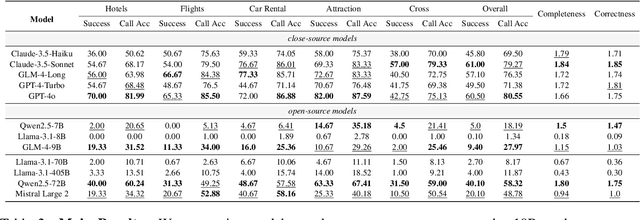
Abstract:Enhancing large language models (LLMs) with real-time APIs can help generate more accurate and up-to-date responses. However, evaluating the function calling abilities of LLMs in real-world scenarios remains under-explored due to the complexity of data collection and evaluation. In this work, we introduce ComplexFuncBench, a benchmark for complex function calling across five real-world scenarios. Compared to existing benchmarks, ComplexFuncBench encompasses multi-step and constrained function calling, which requires long-parameter filing, parameter value reasoning, and 128k long context. Additionally, we propose an automatic framework, ComplexEval, for quantitatively evaluating complex function calling tasks. Through comprehensive experiments, we demonstrate the deficiencies of state-of-the-art LLMs in function calling and suggest future directions for optimizing these capabilities. The data and code are available at \url{https://github.com/THUDM/ComplexFuncBench}.
ChatGLM: A Family of Large Language Models from GLM-130B to GLM-4 All Tools
Jun 18, 2024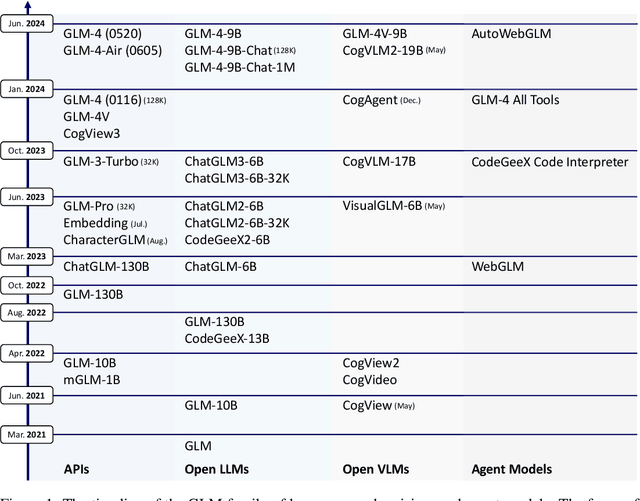
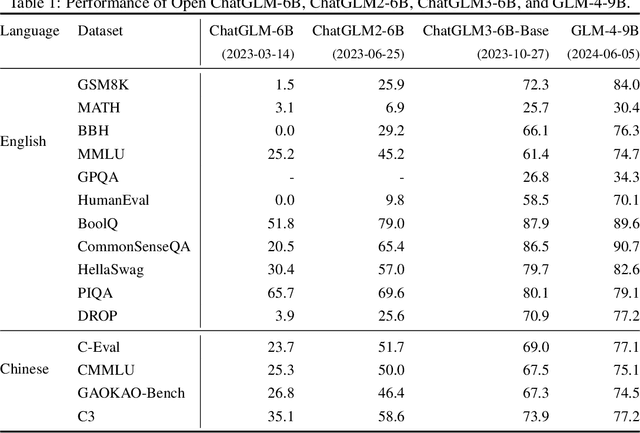
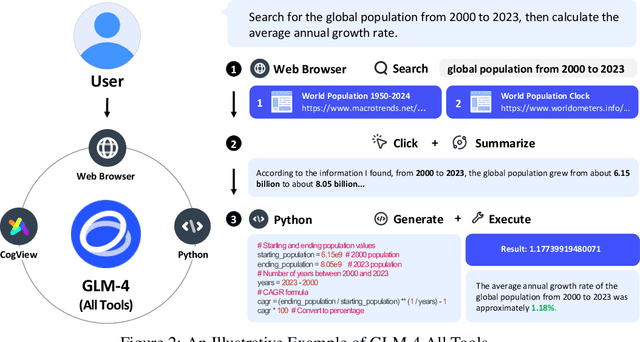
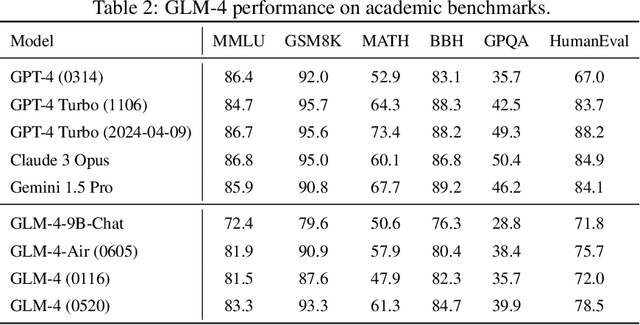
Abstract:We introduce ChatGLM, an evolving family of large language models that we have been developing over time. This report primarily focuses on the GLM-4 language series, which includes GLM-4, GLM-4-Air, and GLM-4-9B. They represent our most capable models that are trained with all the insights and lessons gained from the preceding three generations of ChatGLM. To date, the GLM-4 models are pre-trained on ten trillions of tokens mostly in Chinese and English, along with a small set of corpus from 24 languages, and aligned primarily for Chinese and English usage. The high-quality alignment is achieved via a multi-stage post-training process, which involves supervised fine-tuning and learning from human feedback. Evaluations show that GLM-4 1) closely rivals or outperforms GPT-4 in terms of general metrics such as MMLU, GSM8K, MATH, BBH, GPQA, and HumanEval, 2) gets close to GPT-4-Turbo in instruction following as measured by IFEval, 3) matches GPT-4 Turbo (128K) and Claude 3 for long context tasks, and 4) outperforms GPT-4 in Chinese alignments as measured by AlignBench. The GLM-4 All Tools model is further aligned to understand user intent and autonomously decide when and which tool(s) touse -- including web browser, Python interpreter, text-to-image model, and user-defined functions -- to effectively complete complex tasks. In practical applications, it matches and even surpasses GPT-4 All Tools in tasks like accessing online information via web browsing and solving math problems using Python interpreter. Over the course, we have open-sourced a series of models, including ChatGLM-6B (three generations), GLM-4-9B (128K, 1M), GLM-4V-9B, WebGLM, and CodeGeeX, attracting over 10 million downloads on Hugging face in the year 2023 alone. The open models can be accessed through https://github.com/THUDM and https://huggingface.co/THUDM.
A Task-oriented Dialog Model with Task-progressive and Policy-aware Pre-training
Oct 01, 2023Abstract:Pre-trained conversation models (PCMs) have achieved promising progress in recent years. However, existing PCMs for Task-oriented dialog (TOD) are insufficient for capturing the sequential nature of the TOD-related tasks, as well as for learning dialog policy information. To alleviate these problems, this paper proposes a task-progressive PCM with two policy-aware pre-training tasks. The model is pre-trained through three stages where TOD-related tasks are progressively employed according to the task logic of the TOD system. A global policy consistency task is designed to capture the multi-turn dialog policy sequential relation, and an act-based contrastive learning task is designed to capture similarities among samples with the same dialog policy. Our model achieves better results on both MultiWOZ and In-Car end-to-end dialog modeling benchmarks with only 18\% parameters and 25\% pre-training data compared to the previous state-of-the-art PCM, GALAXY.
 Add to Chrome
Add to Chrome Add to Firefox
Add to Firefox Add to Edge
Add to Edge